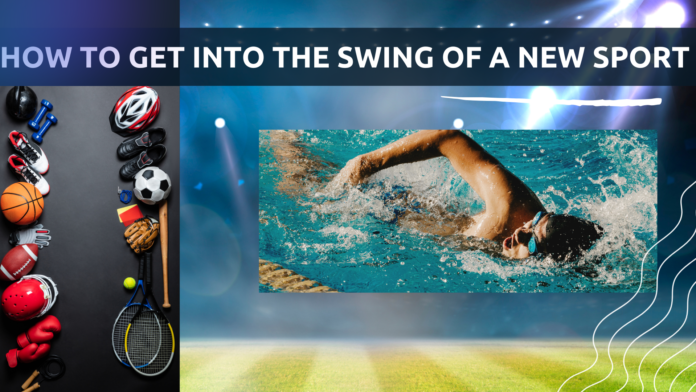Introduction
Starting any new sport can be a very exciting journey of challenges, personal growth, and chances for social connection. Be it the adrenaline of competitive sports, the serenity of solo activities, or the good-natured camaraderie that comes associated with team-based games, knowing how to get started requires great caution and deliberation.
In this article, we will be going through the necessary steps one must undertake when diving into a new sport-from choosing the right activity down to setting achievable goals and overcoming obstacles. With helpful advice, exhaustive research, and attention to the particular experiences associated with each sport, you will know exactly what to do and will be motivated to begin this great journey.
Understanding Your Motivation
But before starting any new sport, it is relevant to ask yourself why you want to start in the first place. Are you looking for a way to keep fit, meet new people, or simply try something different? Your motivation is going to impact not only the choice of sport but also how you’re going to approach that sport. Here are a few common motivations:
Fitness and Health: Most join a new sport for releasing themselves from poor health conditions. Therefore, analyze how the chosen sport suits your goals according to fitness.
Social networks: Sporting team-a great way to meet new friends, as well as make a community of your own.
Personal Challenge: Others enjoy competition and doing better, hence individual or competitive sports are extremely appealing.
Choosing Your Sport
Having known your motives, it is now time to look for different sports around. A few factors to be considered are as under:
Physical Demands: Different sports pose different physical demands. Assess your current fitness level and choose the sport accordingly.
Accessibility: There may be some variations in accessibility depending on where you live. Some sports require specialized equipment or venues that may not always be available.
Interest and enjoyment: This is the most critical factor. You have to love the sport you choose to engage yourself in. Research some different activities and try some out if you can.
Sports to Consider
Running: great for fitness, and the equipment it requires is pretty minimal.
Swimming: Low-impact, great for overall body strength.
Oriented to soccer teams, favors socialization, and access is easy.
Cycling: Casual and competitive versions available; good for all fitness levels.
Yoga: Focuses on flexibility, balance, and mindfulness, great for stress release.
Setting Realistic Goals
Once you’ve chosen a sport, it’s essential that you outline realistic and achievable goals with respect to that sport. These goals, in turn, will also motivate you and give a sense of direction. Consider the following types of goals:
Short-run goals should be aimed at immediate success, such as attending a certain number of classes or practicing for one month.
Long-term goals can be anything from where you want to be in six months or a year, such as competing in a local event or greatly improving in your skillset.
Process Goals: These outline the particular actions you take to achieve or reach your outcomes. An example might be a commitment to practice three times per week.
Sample Framework in Goal Setting
Specific: “I want to run a 5K race.”
Measurable: “I will monitor my running distance and time weekly.”
Attainable: “I will stick to a training plan for beginners.”
Relevant: “Running corresponds with my fitness goal improvement.”
Time-bound: “I will run in a 5K event within three months.”
Finding Resources and Support
It’s very daunting to get into a new sport, but there are so many different resources to help get you started: Local clubs and organizations: Most towns and cities have facilities for various sports, which can help provide coaching, practice facilities, and a supportive environment.
Online Communities: There are others out there with similar interest levels as you on social network sites and forums. You may want to consider joining groups on websites like Facebook or even on the website Reddit.
Coaching and Classes: Professional teaching can help you more quickly get the basics and further advance your skills. Check local gyms and sports clubs for open classes or clinics.
Overcoming Common Challenges
Starting a new sport may come with a number of challenges, but having the right mindset can see you through:
Fear of Failure: A little apprehension is standard when trying to do something new. Remember, everyone starts somewhere, and nobody learns without mistakes.
Time Pressures: A new sport, work, and family life may be tough to juggle. Look for opportunities to apply your sport within your busy schedule, such as early morning sessions or over the weekend.
Plateauing in the Progress: This is actually a case that may happen with any kind of skill development. In case it does, re-evaluation of goals and advice from a personal coach really helps.
Safety Is Paramount
Always keep safety issues in mind when starting into a new sport. Following are some tips to help you stay safe out there while enjoying your new activity:
Get Equipped Properly: Use quality equipment and sportswear for whatever sport one hopes to participate in. This would avoid injuries and also improve performance.
Warm-Up and Cool Down: Allow time to warm up both before practice sessions and cool down afterward to reduce the risk of injury. Listen to your body: Be aware of any sign of discomfort or pain. Rest is important, and further professional advice may be needed if required.
Establishing a Routine
When you are just beginning to get into a sport, consistency is the name of the game. You can keep yourself right on track by getting into a routine, knowing you are improving when you:
Set Apart Practice Times: Penciling practice times into the schedule is akin to any other appointment and is considered important in that calendar.
Mix It Up: Let a little variation in your routine kick in where you can experience different drills, workouts, or locations each time.
Track Progress: Write down in a journal or note these achievements in an application. One major thing this does is that it motivates and further pinpoints your weak areas that need working on.
Sticking to Motivation
Staying motivated is obviously the surefire secret for accomplishing your goals in any sport. The following stand as a few strategies that would help you keep your spirits high:
Look for a training partner: Exercising with a buddy can make practices a lot of fun and helps to keep you responsible for your actions.
Small wins should be celebrated: appreciate and celebrate your progress, no matter how small. Every achievement is one step closer to the bigger achievements you want to make.
New Challenges: Once you have achieved these, set new challenges for yourself to further push you and keep you interested in it.
Conclusion
Getting into a new form of sport may be much about personal growth, fitness, and socialization. Knowing your reasons, choosing the right sport, setting achievable goals, and finding support are keys to an enriching experience. Keep safety first, set a routine, and stay motivated on your journey.
Embrace the challenges, celebrate your successes, and above all, enjoy the ride while discovering the real jewels of your sport. Whether in a competitive arena or enjoying that one activity considered leisurely, the benefits are going to go far beyond the sport into enriching your life in many ways.
20 FAQs
Which is the best sport to start?
Of course, it is for personal interest, but running, swimming, and cycling could be recommended to the starters, too, because of the accessibility.
How do I find a nearby sports club?
Look on community bulletin boards, local gyms, or even online for clubs related to your sport.
What equipment would I need to get into this new sport?
Basic equipment depends on the sport. The things you need, look it up for what you wanna do.
How do I create for myself a desire to practice on a regular basis?
Set concrete goals, then find a training partner while celebrating your successes in an effort to not lose motivation.
What should I do when I feel overwhelmed?
Step back, relook at what you want to achieve, and consider downsizing your vision to something far simpler.
How would I be able to track my progress within this new sport?
Document your dives in a logbook or on a mobile app.
Does one necessarily need a coach to get into any sport?
But not essentially, having a coach first will help.
How can I avoid injuries while practicing a new sport?
Always warm up, wear the right gear, and listen to your body.
What if I don’t like the sport that I chose?
That’s alright, sometimes these things take a few different sports before you find one you really like.
How much time should I devote to getting a grasp of the new sport?
Therefore, try at least 2-3 sessions a week, adjusting based on your goals and schedule.
Are there age-related limitations to start a particular sport?
Most sports can be initiated at any age, but if one has health-related problems, then it is advisable to consult a doctor regarding the same.
What problems can be common for the freshman?
Most common are the fear of failure, time constraints, and reaching plateaus in progress.
Of course, how can I develop new sporting skills?
This will include consistent practice, seeking feedback, and working with a coach in order to enhance one’s skills.
Am I able to practice a new sport by myself?
Of course, most sports can be practiced alone, but social activities tend to enhance the experience.
What are some of the advantages of being a member of a sports community? You get encouragement and motivation, and someone to keep company with; the whole affair is a lot more fun. How do I know if I’m ready to compete? Change to: Feel confident in their abilities and the rules; be interested in competition. What is nutrition’s role in sports? Proper nutrition fuels your body, aids recovery, and enhances performance. How often should I rest for the practice of the new sport? Listen to your body; include rest days so that you can avoid burnout and injuries. Where would one look online for training resources? Search for sport-specific websites, YouTube Channels, and forums. How to balance a new sport into my crazy lifestyle? Prioritize practice sessions, incorporate them into your schedule, and plan for flexibility.








































